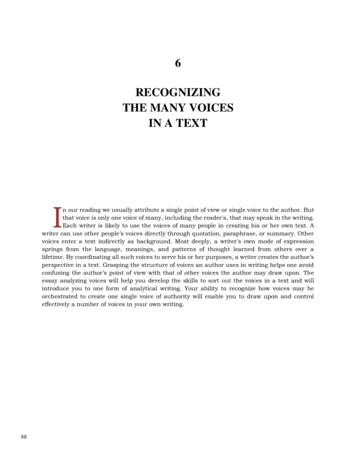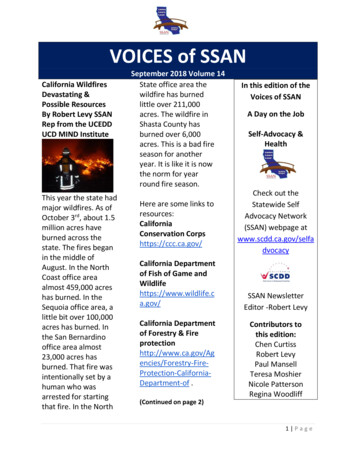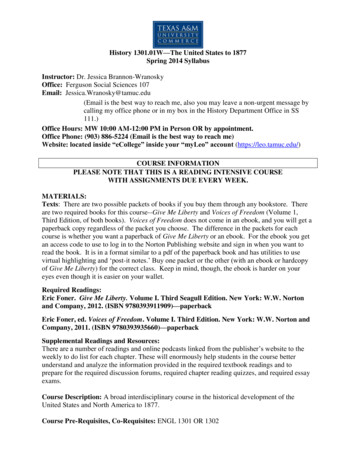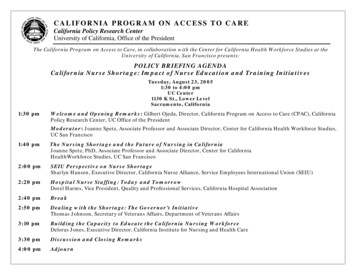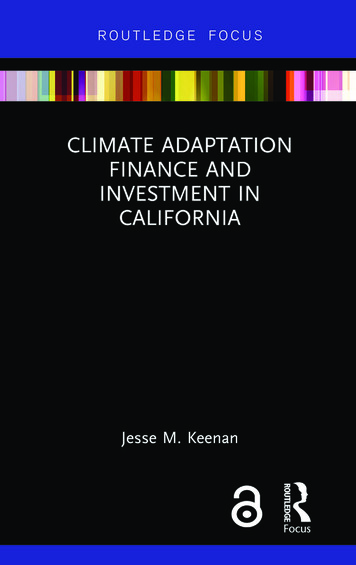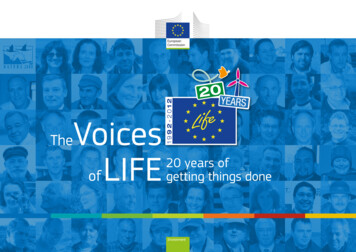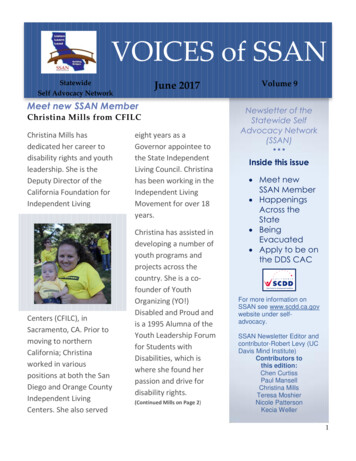
Transcription
VOICES of SSANStatewideSelf Advocacy NetworkJune 2017Meet new SSAN MemberChristina Mills from CFILCChristina Mills hasdedicated her career todisability rights and youthleadership. She is theDeputy Director of theCalifornia Foundation forIndependent LivingCenters (CFILC), inSacramento, CA. Prior tomoving to northernCalifornia; Christinaworked in variouspositions at both the SanDiego and Orange CountyIndependent LivingCenters. She also servedeight years as aGovernor appointee tothe State IndependentLiving Council. Christinahas been working in theIndependent LivingMovement for over 18years.Christina has assisted indeveloping a number ofyouth programs andprojects across thecountry. She is a cofounder of YouthOrganizing (YO!)Disabled and Proud andis a 1995 Alumna of theYouth Leadership Forumfor Students withDisabilities, which iswhere she found herpassion and drive fordisability rights.(Continued Mills on Page 2)Volume 9Newsletter of theStatewide SelfAdvocacy Network(SSAN) Inside this issue Meet newSSAN Member HappeningsAcross theState BeingEvacuated Apply to be onthe DDS CACFor more information onSSAN see www.scdd.ca.govwebsite under selfadvocacy.SSAN Newsletter Editor andcontributor-Robert Levy (UCDavis Mind Institute)Contributors tothis edition:Chen CurtissPaul MansellChristina MillsTeresa MoshierNicole PattersonKecia Weller1Inside this issue Meet new
SSAN Members Charles AdamsNorth Coast Teresa MoshierNorth State Lisa CooleySacramento Chen CurtissNorth Bay Regina WoodliffBay Area Robert BalderamaNorth Valley Hills Cheryl HewittCentral Coast Ramon HernandezCentral Coast Rebecca DonabedSequoia Julie GaonaLos Angeles Robert LevyOrange County Daniel FousteSan Bernardino Paul MansellSan Diego Imperial Desiree BoykinARCA Christina MillsCFILC Nicole PattersonDDS Scott BarronDisability Rights CA Robert LevyUC Davis Mind Institute David FordererSCDD Kecia WellerUCLA Tarjan Center Wesley WitherspoonUSC Children’s Hospitalof Los Angeles(Mills from Page 1)She currently serves onthe board of DisabilityRights Education DefenseFund, (DREDF) and is aState Board of EducationAppointee on theAdvisory Commission forSpecial Education.Christina was born andraised in north San DiegoCounty. She has adisability called,Osteogensis Imperfecta,which means her bonescan sometimes breakeasily. Christina’shusband is also disabledand they have twodisabledchildren thatthey are veryproud of.Their son is two years oldand their daughter, Olivia,recently passed away atthe age of four. Christinais a passionate advocateand activist who caresdeeply about youth withall kinds of disabilities andtheir ability to grow upwith positive disabilityidentity, disabled rolemodels and opportunities.Happenings from Across the StateNorth Bay – by Chen CurtissAdvocate for yourtransportation NeedsDo you live in SolanoCounty? Do you feel yourtransportation needs arebeing met? If not theSolano TransportationAuthority (STA) wants tohear from you.Throughout 2017 mobilitysummits will be held inseven cities throughoutSolano County (Rio Vista,Benicia, Dixon, SuisunCity, Vallejo, Vacaville andFairfield) these summitswill kick off on April 7th(Continued Chen on Page 4)2
More Happenings from Across the StateUC Davis Mind Institute- by Robert LevyMission StatementThe Statewide SelfAdvocacy Network(SSAN) promotesleadership and buildsbridges that strengthenadvocacy amongdisability communitiesby focusing on policychange.SSAN pastNewsletters, AnnualReports, and Meetinginfo, can be found atwww.scdd.ca.govunder self-advocacytabLet us know if you wantto see anything specificin future newsletters!How do you contact theSSAN Newsletter EditorRobert Levy? Leave amessage for him bycontacting the SCDD SelfAdvocacy CoordinatorRiana Hardin at(916) 322-8403The 22nd annualSupported Life StatewideSelf Advocacy Conferencewas another success withall the planning for thisyear’s conference. Manyfolks like ProgressiveEmployment Concepts,other agencies and otherpeople out in thecommunity throughoutour state attended. Thestate of Nevada was thefarthest to come to theconference. There weremany other volunteerswho worked hard tomake this conference asuccess again. There werealmost 400 people whohad attended on May 5-6,2017 at the Crown PlazaHotel in Sacramento.SSAN members, LisaCooley and I presentedabout the CAL ABLE ACTWorks for People withDevelopmentalDisabilities. The nextSupported Life SelfAdvocacy Conferencewon’t be held again untilMay 4-5, 2018- It will bethe 23rd annualSupported Life SelfAdvocacy Conference.The next Supported LifeConference is in the fallOctober 5-6, 2017 at thesame location. For thepeople out in thecommunity you can stillregister online or fill outthe registration packetfor the upcoming Octoberconference. It will be the31st annual SupportedLife Conference. Thebrochures and save thedate are now availableonline. The onlineregistration has not beenposted just yet. You cancheck out at theSupported Life Institutewebsite being atwww.supportedlife.org3
(Chen from Page 2)At the Memorial Hall inRio Vista. We all needreliable and accessibletransportation to live anindependent andproductive life, if youexperience problems withthe service you receiveplease call the SolanoMobility Center at 800535-6883 to register forthe summit near to youand if you needtransportation alsorequest this when youcall.Department ofDevelopmental Services(DDS)By Nicole PattersonMy nameis NicolePattersonand Iwork forthe CaliforniaDepartment ofDevelopmental Services(DDS). DDS is the agencythrough which the Stateof California providesservices and supports toindividuals withdevelopmentaldisabilities.These disabilities includeintellectual disability,cerebral palsy, epilepsy,autism and relatedconditions. Services areprovided through stateoperated developmentalcenters and communityfacilities, and contractswith 21 nonprofitregional centers. Theregional centers serve asa local resource to helpfind and access theservices and supportsavailable to individualswith developmentaldisabilities and theirfamilies.WE WANTYOU!APPLY TO BE ONTHE DDS CACThe regional centerscatchment area DDSis recruiting for areCentral Valley, NorthBay, Far Northern, TriCounties and SanAndreas, but we aretaking all applicationsfor future openings.Major functions for DDSinclude Early Start,developing new services,complaints,communicating withlegislators on behalf ofpeople withdevelopmentaldisabilities, and creating(Continued DDS page 5)4
(DDS continued from page 4)legislation and policies.As Coordinator ofConsumer Services, Iprovide expertise andknowledge to theDepartment’s Director,staff, and advocates onbehalf of individuals withdevelopmentaldisabilities regardingadvocacy issues andconcerns related to theDDS service deliverysystem and relatedprograms.I serve as the coordinatorand liaison for theDepartment’s ConsumerAdvisory Committee(CAC) meetings, activities,and on-going outreachprojects. I preparemeeting materials,coordinate travel formembers and facilitators,develop variousconsumer publications,and coordinatedistribution ofinformation statewideand to other countries.The publications can befound on the ConsumerCorner on the DDSwebsite(www.dds.ca.gov).I provide information andtraining on consumerrights, services andsupports, and advocacyskills techniques toconsumers andDepartmental staff aswell as providers andfamily membersthroughout the State byattendingmeetings,givingkeynotespeechesand breakout sessions atconferences, andproviding information atresource fairs.If you would like moreinformation or assistancein providing training to agroup or agency, pleasecontact me atNicole.Patterson@dds.ca.gov or (916) 654-1494.Pictured above: Nicole Patterson atthe CHOICES Conference withSCDD North Valley Hills officetechnician- Marigene Tacan-ReganCHOICES 30th Annual Conference- by Robert BalderamaThe CHOICES Institute held its 30th annual conference in Stockton and over 500 selfadvocates participated! SCDD Executive Director, Aaron Carruthers and new ValleyMountain Regional Center Executive Director, Tony Anderson spoke to the crowdon April 7, 2017. SSAN’s own- Nicole Patterson was a keynote speaker and had aDepartment of Developmental Services (DDS) resource table at the event! Thetheme was 30 Years of CHOICES and there were Self Advocate keynote speakersthat talked about the choices they have made to live the life they wanted!5
By Kecia WellerTarjan Center Goes tothe Hill:In March, 2017 Dr. OliviaRaynor, Melina Melgoza,Violetta Chavez-Serrano,Dr. Artha J. Gillis ourDiversity Fellows, andCindy Liu, TAC memberattended the 2017Disability Policy Seminarwhich was sponsored bythe American Associationon Intellectual andDevelopmentalDisabilities, The Arc, theAssociation of UniversityCenters on Disabilities(AUCD), the NationalAssociation of Councils onDevelopmentalDisabilities, SelfAdvocates BecomingEmpowered, and UnitedCerebral Palsy. While inD.C. the trainees visitedthe offices ofRepresentative Lieu,Representative Cardenas,and RepresentativeBrownley to advocate forprotecting Medicaid.They also discussed thevalue of their trainingexperience with theTarjan Center. Cindyrelayed her powerfulpersonal story as a parentto make sure there is aninclusive path forward forher daughter. We werewell received byresponsive legislativeoffices who valued ourvisit.Competitive EmploymentIncentives that MayImpact the Engagementof Individuals withIntellectual andDevelopmentalDisabilities (IDD):The Tarjan Centers Openthe Doors to Collegehosted a webinar on“CompetitiveEmployment Incentivesthat May Impact theEngagement ofIndividuals withIntellectual andDevelopmentalDisabilities (IDD)” thattook place on MondayMarch 6, 2017. Thepurpose of the webinarwas to provide Californiacommunity colleges andcommunity partners withinformation on two newlyauthorized programs (i.e.the CompetitiveIntegrated EmploymentIncentives Program andthe Paid InternshipProgram) for individualsthat are regional centerconsumers. Participantslearned about two newregional center programs.The first is funding (up to 3,750 per regionalcenter client) for regionalcenter vendors who assistindividuals with IDD totransition from school tocompetitive integratedemployment. The secondis up to 10,400 perintern per state fiscal yearin funding to cover wagesduring a paid internshipfor a regional centerclient as a pathway tocompetitive integratedemployment.UCLA PEERS Teampresents at the 50thAnnual GatlinburgConference:Dr. Laugeson, Director ofTraining at the TarjanCenter, and her teamattended the 50th AnnualGatlinburg Conference on(Continued Tarjan page 7)6
(Continued from page 6)Research and Theory inIntellectual andDevelopmental Disordersin San Antonio, Texas. Dr.Laugeson presented asymposium on the resultsof her study, “UsingParent Assistance andVirtual Coaching toImprove Social Skills inTeens with Autism: TheUCLA PEERS Program” toseveral hundredconference attendees.Research assistants fromthe PEERS lab alsopresented at theconference. AnaMendoza presented aposter entitled, “TheRelationship betweenSocial Anxiety andPerceived Intelligenceand Happiness amongAdolescents with AutismSpectrum Disorder.” YuanZhang presented a posterexamining “Self-esteemas a Mediator of SocialSkills Improvement andSocial Anxiety forAdolescents with AutismSpectrum Disorder (ASD)following the UCLAPEERS Program.”Rhideeta Jalal presenteda poster investigating“Positive Self-Esteem asa Predictor of TreatmentOutcome in Adolescentswith ASD following theUCLA PEERS Intervention.”National Arts andDisability Center (NADC)Announcement:ANNOUNCEMENT: TheNational Arts andDisability Center (NADC)would like to announcethat funds are availablefor the 2016-2017 Artsand Accessibility GrantsProgram. Artist grants arefor specific projects thatcontribute directly totheir professionalgoals anddevelopment. Californiabased arts organizationsmay request supportfor the hiring orinvolvement of artistswith disabilities in artsevents, and/or toincrease the attendanceand enhance theexperience foraudiences withdisabilities. Please readthe Guidelines for moreinformation. If you haveany questions feel free toreach Beth Stoffmacher,NADC ArtsSpecialist, bstoffmacher@mednet.ucla.eduOn March 28, 2017,Wilbert Francis,Attended the NationalCoordinating CenterAccreditation WorkgroupMeeting in Washington,DC:The AccreditationWorkgroup is responsiblefor the development ofaccreditation standardsfor postsecondaryeducation (PSE) programsfor students withintellectual disabilities(ID). PSE institutions andprograms seekaccreditation from atleast one of the regionalaccreditation agencies.Accreditation is anindication of quality, acommitment to studentoutcomes, and effortstowards continuousimprovement. Currently,higher educationprograms for studentswith ID are not accreditedby regional accreditors.The workgroup has(Continued Trajan page 8)7
(Continued from page 7)developed standards forquality PSE for studentswith ID and is workingwith the U.S. Departmentof Education to identifyan agency that will reviewand provide accreditationto PSE programs forstudents with ID. TheAccreditation Workgroupestablished threecommittees (i.e.,Accreditation OutreachCommittee, StudentLearning Outcomes andCredentials Committee,and the Self-StudyDevelopmentCommittee). Mr. Francisis a member of the SelfStudy Committee andattended this meeting inWashington DC.Reproductive HealthcareExperiences of Womenwith Cerebral Palsy:Dr.’s Katharine Hayward,Eileen Fowler andcolleagues in UCLAOB/Gyn department andthe Center for CP at UCLAhad their manuscript“Reproductive healthcareexperiences of womenwith cerebral palsy”accepted for publicationin the Disability andHealth Journal. It will bepublished in a specialedition of the journal inJuly. This work wasfunded by the CerebralPalsy Foundation. Theyfound that pregnancyrates and discussionswere higher in womenwith the greaterfunctional ability.Mobility decreasedduring and afterpregnancy but there wererelatively few referrals tophysical or occupationaltherapy. There was ahigher rate of Cesareansection deliveries andpreterm births comparedto national averages. As20% of the 375 womenwith cerebral palsysurveyed experienced atleast one pregnancy,there is a need toincrease awareness,education, support andadvocacy.UCEDD Directors Retreatand Technical AssistanceInstitute:Dr. Raynor attended theUCEDD Directors Retreatin April, 2017 where shenetworked, and meetwith federal projectofficers, and learned newinitiatives, nationaltrends, and otherinformation vital to theadministration of theUCEDD.In April, Dr. ElizabethLaugeson Visited Japanfor the Launch of theJapanese Translation ofHer Book, “The Scienceof Making Friends.”Dr. Laugesoncollaborated with Dr.Masatsugu Tsujii andTomoko Yamada on thetranslation of this book,which is based on thePEERS program andoffers parents a step-bystep guide to provide“social coaching” to teensand young adults. Itincludes concrete rulesand steps of socialetiquette identifiedthrough research.Prior to the launch of“The Science of MakingFriends” into Japanese,validation of PEERS forAdolescents wasconducted by TomokoYamada who completed(Continued on page 9)8
(Continued from Page 8)a cross-cultural validationstudy with PEERS atOsaka University andfound similar findings towhat Dr. Laugeson hasfound in her researchstudies in North America.While in Japan, Dr.Laugeson also hosted aQ&A with young adultsfor the Asperger Societyof Japan, and conducteda 1-day workshop tointroduce PEERS toJapanese mental healthprofessionals andeducators. Check out theUCLA PEERS ClinicFacebook page to see thephotos from the event!Dr. Liz Laugeson will bepreseting on Navagatingthe Dating World forYoung Adults with DiversChallenges:On May 5, Dr. LizLaugeson presented on“Navigating the DatingWorld for Young Adultswith Diverse Challenges”at the Hel Group’s 2017Advance LA Conference.This conference featurednationally prominentexperts whose researchand practice supportyoung people withautism, learningdifferences and ADHD intheir transition to college,the work place andbeyond. The speakersdiscussed ways toencourage and guideyoung adults as theyconnect to themselves, toothers, and to theiracademic and vocationalpursuits in order to createmeaningful andrewarding lives.More Happenings from Across the StateSan Diego & Imperial – by Paul MansellSelf-Advocacy is alive and well in San Diego and Imperial Counties. ImperialValley People First held its annual conference on March 4th at the BarbaraWorth Hotel in Holtville. 121 people attended. The theme was “Don’t beOrdinary, be Extraordinary.” The key note speaker was Miguel Lugo. SanDiego Regional Center during March gave presentations to staff onEmployment First. In March San Diego Regional Center started givingpresentations to clients on HCBS. SDRC has formed a CalABLE task forceand is preparing for it to become up and running this summer. On June 2ndand 3rd, San Diego People First will hold its 27th annual Self-Advocacyconference at the Marriott Hotel in Mission Valley, San Diego. The theme is“Dare to dream.” The keynote speaker is Miguel Lugo.9
Oroville Dam Crisis-Teresa Moshier’s Interview withSCDD’s Mary Agnes Nolan on BeingEvacuated!preparednesstraining so IHow were you notifiedthat you had toevacuate?I received phone callsfrom family memberswho were watching TVwho told me to get homeright away because theywere evacuating Butte,Yuba, and Sutter Countiesimmediately saying theOroville dam was aboutto break. I also received atext from my county alertsystem.Was it scary when youwere told to leave?It was scary because I was10 miles west of YubaCity and my son was notwith me. I had to rushhome while trying toreach my son andconvince him that he hadto get home. He wasrefusing because hewanted to stay with hisfriends and play Axis andAllies Board Game. Thedrive back to Yuba Citywas stressful becausethere were a lot ofcars leaving and Iwasn’t sure they’d letme back in. I was alsoconcerned about mydog because hedoesn’t travel well andI knew I would bestuck in traffic for along time. I haveseveral neighbors whodon’t have any familyin California and theydidn’t have anywhereto go. They were veryscared so it took timeto help them getdirections to myproperty in Williamsso they could taketheiranimals.had To Go Bags ready formy dog and myself. Ithought my son had hisTo Go Bag ready but itwasn’t even though hetold me it was. The newscovered the problemswith the dam for daysbefore we were told toevacuate so I knew to BePrepared. Theexperience wasfrustrating because it washard to get consistentinformation about whatwas happening and howmuch time we actuallyhad to leave. I wasgetting many calls fromfriends who were worriedabout us and at the sametime, I was trying to listen(Continued Moshier page 11)How did it feelto beevacuated?It felt like a lotof work. I amlucky because Ihave had someemergency10
(Moshier continued frompage 10)to the news. The newsstations were givingconflicting information.There was a lot ofpressure coordinatingwith our neighbors toensure everyone had aplace to go. I was alsohaving a hard time talkingmy son into leavingbecause he didn’t believewe were be told we hadto evacuate and hisTo Go Bag wasn’t ready.He finally believed mewhen I showed him themandatory evacuationalert from Sutter County.Where did you go?We went to Williams inColusa County. Westayed at our family ranch.Several of my neighbors,6 dogs and 3 cats wentwith us.How long did you have toevacuate?At first we were told wehad 1 hour to leave.Later we were told itwould take 6 hoursbefore the flood wouldhit Yuba City. We weregone from Sunday toTuesday afternoon whenwe were told theevacuation was lifted toan “Advisory Status.”Advisory status means itwas RECOMMENDED tostay evacuated but wedidn’t HAVE to. We werealso told we were neededto be prepared to leaveagain at a moment’snotice.What did you learn fromthe evacuation?I learned that peopleoften think they areprepared and theyactually aren’t. I hadfriends who didn’t havetheir medicines withthem. I saw a lot ofpeople run out of gas andthe gas stations ran out ofgas to sell. There were alot of accidents. Peoplewere panicking. A lot ofpeople left their animalsand were very worriedabout them. We werelucky because my familyhas practiced what to doand where to go but mostpeople hadn’t thoughtabout what they woulddo. Years ago I took theDDS EmergencyPreparedness Training soI knew what to do. Irecommend everyonepractice what to do incase of an emergency,don’t just talk about it. Ididn’t panic because Iknew what to do and wehad practiced it. BecauseI have practiced what todo, I wasn’t as stressed aseveryone else. My sonalso learned to believeme when I tell him it is anemergency.11
Nicole.Patterson@dds.ca. gov or (916) 654-1494. Pictured above: Nicole Patterson at the CHOICES Conference with SCDD North Valley Hills office technician- Marigene Tacan-Regan . 6 By Kecia Weller Tarjan Center Goes to the Hill: In March, 2017 Dr. Olivia Raynor, Melina Melgoza,
